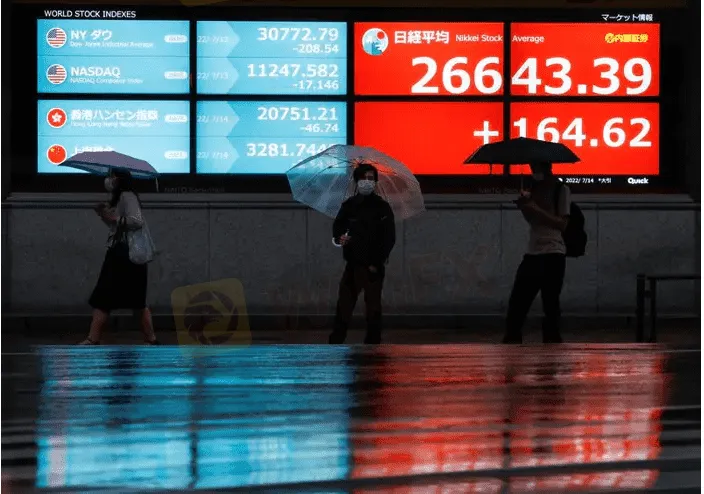简体中文
繁體中文
English
Pусский
日本語
ภาษาไทย
Tiếng Việt
Bahasa Indonesia
Español
हिन्दी
Filippiiniläinen
Français
Deutsch
Português
Türkçe
한국어
العربية
Shares rally as markets bet on more gradual rate hikes
Abstract:Asian stocks took their cue on Friday from a late rally on Wall Street, as markets focused on a possible slowdown in the pace of rate hikes rather than a U.S. recession after data showed its economy shrinking for a second straight quarter.

MSCI‘s broadest index of Asia-Pacific shares outside Japan rose 0.41%. Japan’s Nikkei share average opened up 0.36%, while the Seoul index and Australias index opened up 0.75% and 0.76% respectively.
Economists are debating whether the worlds biggest economy is already in or on the verge of a recession, as it battles its highest inflation in four decades and gross domestic product shrinks – at a 0.9% annualized rate last quarter, after a 1.6% contraction in the quarter before that.
The Federal Reserve delivered another aggressive interest rate hike of 75 basis points this week, its third this year.
Meanwhile, China, still in the throes of COVID-19 outbreaks and lockdowns, did not mention its full-year GDP growth target after a high-level Communist Party meeting and said instead it will try hard to achieve the best possible results for the economy this year.
U.S. equities, however, rallied this week as comments by Federal Reserve Chair Jerome Powell led to speculation that rate hikes would begin to slow and eventually turn to rate cuts in 2023. Shares of Amazon and Apple shot up 12% and 3% each after hours after the tech giants reported earnings that beat expectations.
The Dow Jones Industrial Average rose 332.04 points, or 1.03%, to 32,529.63, the S&P 500 gained 48.82 points, or 1.21%, to 4,072.43 and the Nasdaq Composite added 130.17 points, or 1.08%, to 12,162.59.
But analysts warned the rally could be short-lived.
“Financial markets have taken the combination of the … (Fed) announcement and … the negative U.S. GDP print as confirmation that policymakers will ease off their aggressive monetary tightening cycle before too long. Our sense, however, is that such hopes are premature and that some of this years dominant trends, notably the rise of the U.S. dollar, will reassert themselves before too long,” Capital Economics said in a note.
The dollar stayed near a six-week low against the yen for similar reasons, trading at 134.39 yen, bouncing 0.13% after an overnight plunge of 1.74%, the most since March 2020. It touched a low of 134.2 on Thursday, the weakest since June 17.
U.S. Treasuries slipped on the weak economic data, with the yield on benchmark 10-year Treasury notes retreating to 2.6759%. The two-year notes yield, which typically moves in step with interest-rate expectations, was at 2.8703%.
“Theres this see-saw at the moment with inflation and growth concerns,” said Tom Nash, fixed income portfolio manager at UBS Asset Management in Sydney, with surprisingly soft U.S. growth figures putting the focus on the latter.
“When it‘s inflation concerns, yields are going up, when it’s growth concerns yields are going down. What were seeing at the moment is the market is putting less emphasis on inflation and more on growth.”
Brent crude futures rose 0.8% to $108 a barrel and U.S. West Texas Intermediate crude (WTI) was up 1.08% at $97.46.

Disclaimer:
The views in this article only represent the author's personal views, and do not constitute investment advice on this platform. This platform does not guarantee the accuracy, completeness and timeliness of the information in the article, and will not be liable for any loss caused by the use of or reliance on the information in the article.
Read more

Bank Negara Malaysia Flags 12 New Companies for Unauthorised Activity
Bank Negara Malaysia (BNM) has updated its Financial Consumer Alert List (FCA List) by adding 12 more entities, reinforcing its efforts to warn the public against unregulated financial schemes. Check if your broker made the list!

TradingView Brings Live Market Charts to Telegram Users with New Mini App
TradingView has launched a mini app on Telegram, making it easier for users to track market trends, check price movements, and share charts.

March Oil Production Declines: How Is the Market Reacting?
Oil production cuts in March are reshaping the market. Traders are closely watching OPEC+ decisions and supply disruptions, which could impact prices and future production strategies.

How to Calculate Leverage and Margin in the Forex Market
Leverage amplifies both potential profits and risks. Understanding how to calculate leverage and margin helps traders manage risks and avoid forced liquidation.
WikiFX Broker
Latest News
The Withdrawal Trap: How Scam Brokers Lure Victims into Paying More
FCA to Investors: Think Twice Before Trusting These Brokers
Trump\s tariffs: How could they affect the UK and your money
Trump gambles it all on global tariffs he\s wanted for decades
TradingView Brings Live Market Charts to Telegram Users with New Mini App
Trump tariffs: How will India navigate a world on the brink of a trade war?
IG Group Acquires Freetrade for £160M to Expand UK Investment Market
U.S. March ISM Manufacturing PMI Released
Should You Beware of Forex Trading Gurus?
Vanuatu Passes VASP Act to Regulate Crypto and Digital Assets
Currency Calculator







